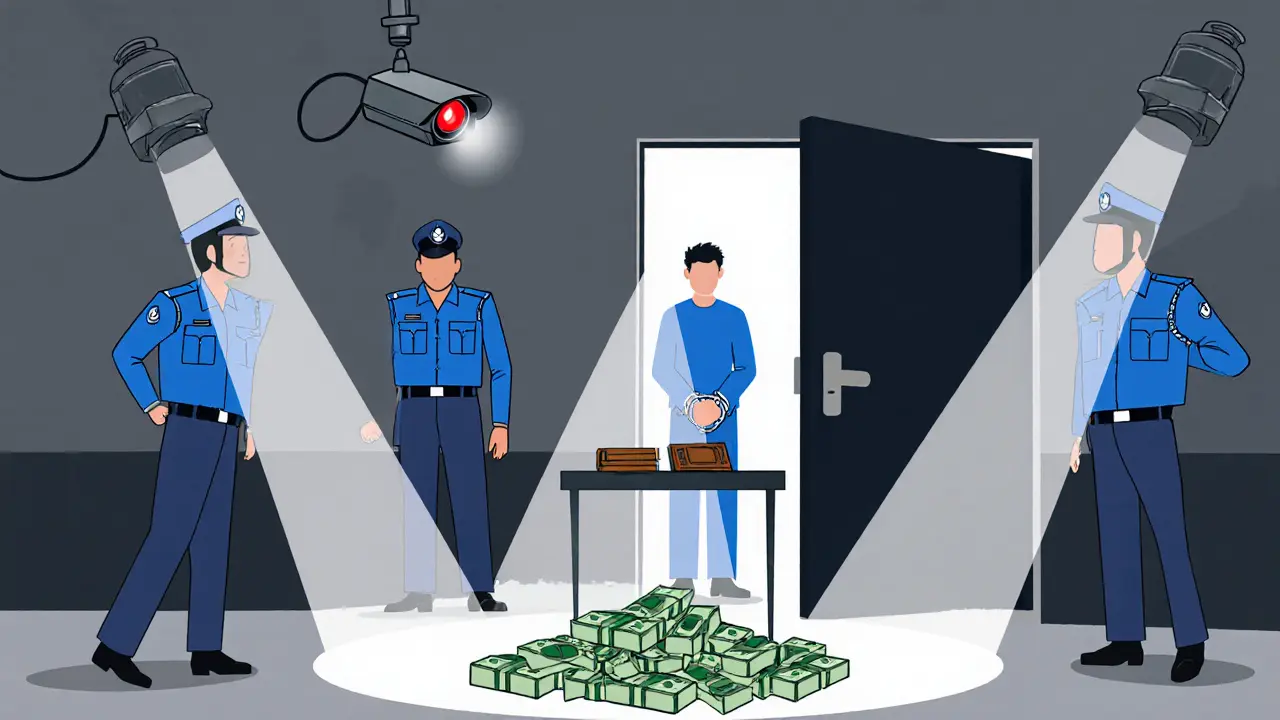Underground Crypto Trading in Nepal: Methods, Risks & Enforcement
 Feb, 12 2025
Feb, 12 2025
Nepal Crypto Trading Risk Calculator
Assess potential risks of underground crypto trading in Nepal based on your activity and security practices. Input your trading details below to get a personalized risk assessment.
Even though the Nepal Rastra Bank slapped a total ban on crypto in 2017, a hidden market keeps humming. If you’ve ever wondered how Nepali traders still buy, sell, and move digital coins, this guide breaks down the tools they use, the dangers they face, and why the police can’t quite shut it down.
Legal backdrop - why the underground market exists
Neighbourhbors has a hard line. The Nepal Rastra Bank (NRB) the central bank that prohibits any cryptocurrency activity, from mining to trading issued a 2017 circular that makes owning or transacting in Bitcoin, Ethereum or any other digital token a punishable offense under the country’s cyber‑crime and foreign‑exchange laws.
Violations can lead to hefty fines, seizure of assets, and up to three years in jail. The ban also covers indirect participation - even using a VPN to reach an overseas exchange is illegal. Yet demand for cross‑border remittances and speculative investment stays strong, pushing people into the shadows.
How traders slip past the ban
Below are the most common workarounds Nepalis employ:
- P2P platforms: Services like Binance P2P a peer‑to‑peer marketplace that matches buyers and sellers without a central order book let users post ads, negotiate prices, and settle trades via local payment methods such as eSewa a popular Nepali digital wallet used for bill payments and transfers or traditional bank transfers.
- VPNs and proxy tools: By masking their IP address, traders can reach blocked exchange websites. The Virtual Private Network (VPN) a service that encrypts internet traffic and routes it through servers in other countries is now a staple of the underground community.
- Encrypted messengers: Coordination happens on apps like Telegram a cloud‑based messaging app with secret chats and large group support and WhatsApp the ubiquitous mobile messaging platform with end‑to‑end encryption. Groups share price alerts, wallet addresses, and tips on staying invisible.
- Multi‑bank layering: Traders open accounts at several banks, sometimes in different cities, to scatter transaction footprints. They then funnel funds through small, frequent transfers that look like ordinary remittances.
- Cash‑in‑cash‑out hubs: Small retail shops, especially those dealing with cross‑border goods, act as informal conversion points. Sellers receive cash for crypto and hand over local currency on the side.
Each layer adds a hurdle for law‑enforcement, but also a point of failure if any link is traced.
Risks - why the underground life is a high‑stakes game
Operating in the shadows carries legal, financial, and personal threats:
- Legal penalties: Arrests, courtroom battles, and assets frozen. The 2025 case that netted the Central Investigation Bureau (CIB) the elite unit of Nepal Police handling complex financial crimes crackdown on two Indian nationals shows the scale of enforcement.
- Scams and fraud: Without regulated intermediaries, traders depend on trust. Rug‑pulls, fake wallets, and phishing attacks are common, and victims rarely get recourse.
- Technical mishaps: Misconfigured VPNs can leak real IPs. Mistakes in wallet address entry lead to irreversible loss of funds.
- Psychological stress: Constant vigilance, fear of raids, and the need to keep multiple secret channels wear on mental health.
Enforcement in action - a recent high‑profile bust
In July 2025, the CIB, working with the NRB’s AML unit, raided a grocery store in Lalitpur that doubled as a crypto hub. Two Indian nationals, Rupesh Kumar Gupta a 43‑year‑old investor linked to several offshore wallets and Bipin Kumar a 22‑year‑old associate managing day‑to‑day trades were arrested for moving more than Rs 1.5 billion worth of crypto.
Police seized Rs 820,000 in cash, Indian rupees worth INR 10,000, and a trove of CCTV footage. Charges were filed under Criminal Code 2074 for “unauthorized use of virtual currency” and illegal hundi transactions. The case sent a clear message: the state is willing to target not only individual users but also organized cross‑border operations.
Regional comparison - why Nepal feels isolated
Neighboring countries have taken softer routes, which fuels frustration among Nepali traders. The table below highlights the legal stance of three South Asian nations as of 2025.
| Country | Regulatory approach | Key enforcement tools |
|---|---|---|
| Nepal | Total ban - mining, trading, holding illegal | IP monitoring, bank transaction analysis, VPN crackdown |
| India | Regulated market - licensing for exchanges, tax reporting | SEBI oversight, AML checks, FIR filing for fraud |
| Bhutan | Exploratory pilots, limited crypto use for tourism | Pilot‑specific guidelines, limited surveillance |
The stark contrast explains why many Nepalis look across the border for more permissive platforms, even if that means risking legal action at home.

Survival tactics - how underground traders stay one step ahead
Seasoned participants follow a checklist that blends tech savvy with operational discipline:
- Choose a reputable VPN provider with a no‑logs policy and rotate servers weekly.
- Operate a hardware wallet (e.g., Ledger Nano) for long‑term storage; keep the seed phrase offline.
- Use separate bank accounts for each trade batch to prevent pattern detection.
- Communicate only in encrypted group chats that require invitation links; purge old messages regularly.
- Verify counterparties via multiple channels - a Telegram ID, a phone number, and a small test transaction before moving larger sums.
- Keep a local “emergency” fund in cash to cover legal fees if a raid occurs.
Even with these safeguards, the risk never disappears. The community’s shared knowledge pool is fragmented, and new entrants often rely on trial‑and‑error, which can be costly.
Future outlook - will the ban hold?
Several forces could shift the current equilibrium:
- International pressure: Global financial bodies are urging Asian regulators to adopt clearer frameworks. If neighboring India finalizes a comprehensive crypto law, Nepal may face diplomatic and economic incentives to soften its stance.
- Economic need: Remittances constitute a large share of Nepal’s GDP. Digital assets can cut transaction costs, and the government could eventually see a regulated path as a revenue source.
- Technological evolution: Decentralized finance tools that bypass traditional banking may become harder to police, forcing a policy rethink.
Legal experts surveyed in 2025 agree that a full reversal is unlikely in the short term, but a partial relaxation - allowing licensed exchanges or limited mining for research - is possible. Until then, the underground market will adapt, using newer privacy coins, decentralized identifiers, and perhaps even mesh networks to stay out of sight.
Quick takeaways
- The NRB’s total ban forces crypto activity underground, but demand remains high.
- P2P platforms, VPNs, and encrypted messengers are the primary tools for Nepali traders.
- Legal consequences are severe; recent raids show authorities can dismantle sizable operations.
- Regional comparisons highlight Nepal’s isolation, driving cross‑border workarounds.
- Survival hinges on tech hygiene, layered financial paths, and constant risk assessment.
Is cryptocurrency illegal in Nepal?
Yes. The Nepal Rastra Bank banned all crypto activities in 2017, and the law covers mining, trading, holding, and even using a VPN to access foreign exchanges.
How do Nepali traders access Binance P2P?
They typically connect through a VPN, then settle the trade using local payment apps like eSewa or bank transfers that appear as ordinary remittances.
What are the penalties for crypto‑related offenses?
Offenders can face fines up to several lakhs of rupees, seizure of assets, and imprisonment for up to three years under the cyber‑crime and foreign‑exchange statutes.
Can I use a hardware wallet in Nepal without breaking the law?
Owning a hardware wallet isn’t illegal, but using it to buy, sell, or transfer crypto is prohibited and can be used as evidence in an investigation.
What’s the outlook for crypto regulation in Nepal?
The ban is expected to stay in place for now, but pressure from the remittance sector and regional policy shifts could lead to limited licensing in the next few years.
Lena Novikova
October 25, 2025 AT 21:27Derajanique Mckinney
October 26, 2025 AT 13:16Olav Hans-Ols
October 26, 2025 AT 13:29Sheetal Tolambe
October 26, 2025 AT 21:49Saurav Deshpande
October 27, 2025 AT 14:22Rosanna Gulisano
October 28, 2025 AT 06:38MICHELLE SANTOYO
October 28, 2025 AT 18:05Herbert Ruiz
October 29, 2025 AT 05:14Pranav Shimpi
October 29, 2025 AT 18:34Paul Lyman
October 30, 2025 AT 16:45james mason
October 31, 2025 AT 11:05gurmukh bhambra
November 1, 2025 AT 03:50Dr. Monica Ellis-Blied
November 1, 2025 AT 09:33Sunny Kashyap
November 2, 2025 AT 05:53Kevin Johnston
November 2, 2025 AT 07:38Anna Mitchell
November 3, 2025 AT 01:02Frech Patz
November 3, 2025 AT 05:56